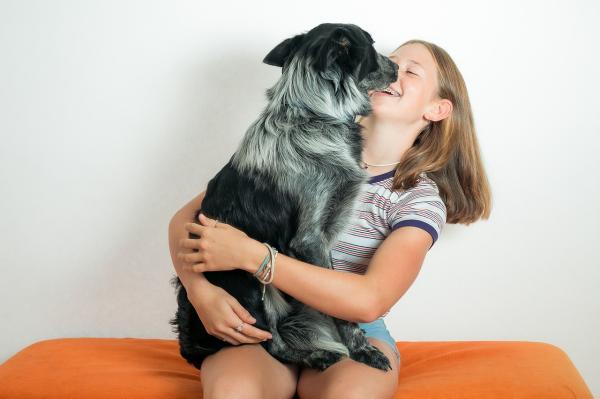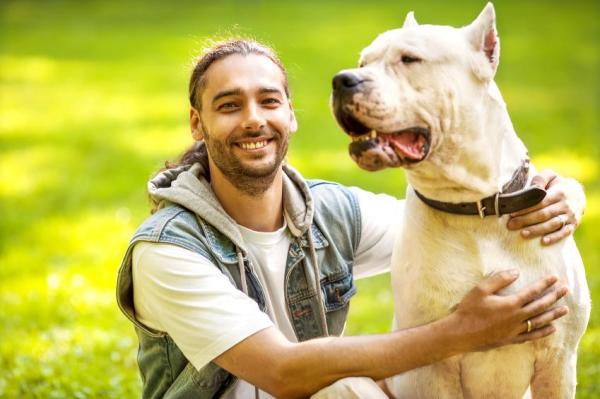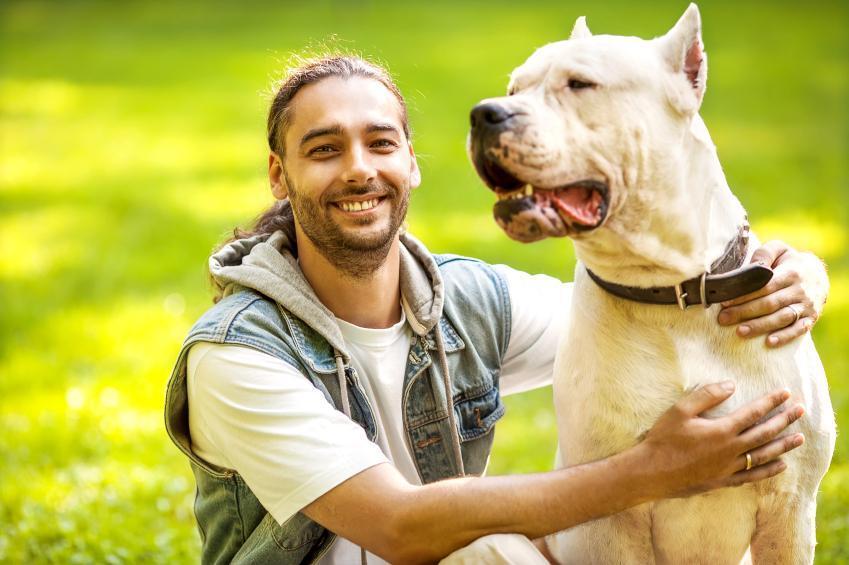How to Socialize an Adult Dog



See files for Dogs
The period of socialization begins from the time a dog is a puppy. The most important socialization period is from the age of 3 to 12 weeks. During this time, the puppy learns from their mother and siblings about how to interact with other animals and their environment. If this socialization period is neglected for whatever reason, it can have serious repercussions on the dog's behaviors and well-being when they reach maturity. When this occurs, it doesn't mean the dog can never be socialized, but it does mean that the process of socialization can be much more difficult.
At AnimalWised, we explain how to socialize an adult dog. We look at the practical steps you need to take to encourage socialization at a later stage. It is important to note this is required not only when an adult dog is showing aggression. Socializing a dog with other dogs, people and environments will improve their well-being.
Socializing an adult dog
There are various reasons a dog will not be well socialized when they are a puppy. The most common reason is being removed from their mother and siblings too early. In these cases, the dog is unable to learn basic boundaries and skills which will help them navigate adulthood. These include practical issues such as bite inhibition, but it is also very important in terms of security. Dogs that have been separated from their mother too soon often do not know how to manage their emotions.
Another reason a puppy's socialization may be poor is due to being the only pup in a litter, although this is relatively rare. They may learn a lot from their mother, but not having siblings can affect their socialization. It is also possible for puppies to lose their mother due to either death or abandonment.
Many dogs lack proper socialization due to errors made by their human guardians. Although the period when they are with their mother and siblings is vital, a dog's introduction to the domestic environment is also very important. Meeting the responsibility of dog guardianship begins well in advance of adoption. We need to know what to expect, as well as be practically and emotionally prepared to meet the needs of our puppy.
For young dogs, entering the home can be an anxious experience. After separation from their canine family, they can encounter an environment with a lot of stimulation, many of which consist of strange elements. If the guardian does not introduce the dog to their new environment properly, does not provide exposure to different kinds of animals and people, or generally neglects their specific needs, their socialization can be poor.
Adult rescue dogs are often the most in need of socialization. It is unlikely a dog which has never lived with a human family will adapt once they have reached maturity as they will be essentially feral. However, some dogs may have been abandoned, neglected or even abused, but are still able to be socialized. This process can be difficult, but we reveal what you need to know about how to socialize an adult dog.
What stage of socialization is your dog?
Before we learn how to socialize an adult dog, we need to assess their individual needs. Although there are general guidelines to follow, each case is different and each dog will react to the socialization process differently. For this reason, we must stress that not all of these tips may be suitable for your dog.
Dogs need to be socialized as a puppy as they have yet to gain their specific personality. Factors such as breed and genetic inheritance will influence their behavior, but only partly. At this young stage, they have less fear and they don't have memories of different stimuli which make them reject or accept them.
Socialization is understood as the process in which the dog interacts with the surrounding environment. Said environment can be very diverse. In order for the process to be considered as complete, the dog needs to accept and react positively to the following:
- Urban environments
- Nature
- Vehicles
- General noise
- Children
- Adults
- Elderly people
- Teenagers
- Toys
- Other dogs
- Cats
- Other animals
This is only a partial list and the elements with which your dog needs to be socialized will depend on their specific environment. For example, some people may be able to bring their dog to work, so the dog will need to be appropriately socialized with an office environment.
Analyze the adult dog's situation
It is usually more difficult to socialize an adult dog. Adult dogs have memories memories and experiences that make them react to stimuli in a certain way. It is essential for you to analyze the character and personality of your dog, as well as look at their history, where possible. We also need to look at the context of their situation, such as whether we live with other animals or the general home dynamic.
When socializing an adult dog, the three main factors to consider are:
- Other animals
- People
- Environment
Look at how your dog reacts to these specific stimuli. For example, you dog may be fine with other dogs, but is not good with strange people. There may be certain environments where they are perfectly happy, but we can find them becoming very anxious in others. Once you have analyzed which stimuli affect your dog, look at how they react. Some may become aggressive, others more timid.
In order to effectively address the problem, you need to make a list of all the behaviors they exhibit. It is vital to know your adult dog and observe their behavior so you can socialize them properly.
How to socialize an adult dog
As we have already stated, it can be difficult to socialize an adult dog. How difficult this will be depends on the behaviors of the individual. If a dog is acutely scared and behaves very erratically, it can prove very difficult to socialize. If a dog is timid, but curious around other stimuli, their socialization process is likely easier.
Essentially, the process of socialization requires us to take the dog to interact with other animals, people and environments. We do this in a supervised and cautious manner, but there are many factors to take into consideration. Here we look at what you can do to best ensure an adult dog is well socialized.
Tips for socializing adult dogs
- Five freedoms of animal welfare: the five freedoms of animal welfare are appropriate and high-quality food, comfort and convenience in their daily lives, taking them to the vet if necessary, letting them naturally express themselves and avoiding fears and stress at all costs. Once we have these basic care requirements covered, we are in a better position to socialize the adult dog.
- Appropriate walks: it is important for your dog to have the right level of walking per day. Failure to do so will have direct repercussions on the socialization process, with the dog returning to a state of isolation, fear and nervousness. Dogs generally need two to three walks per day, but some will need more or less depending on their energy levels, health and other factors.
- Exercise: daily walks is rarely enough exercise for your dog. Providing more intensive exercise is particularly good for nervous dogs with high levels of energy. Furthermore, socializing a dog after doing exercise is much more effective, since the dog is relaxed and is more likely to accept new situations.
- Positive reinforcement: when socializing an adult dog, it is essential you only use positive reinforcement dog training. This will help you achieve much quicker and more effective results.
- Don't scold or hit your dog: as some dogs will have behavioral problems, it is possible we can get frustrated during the process of socializing an adult dog. However, it is a mistake to scold or hit them. Not only might this be harmful for the dog's well-being, it is an ineffective method of training. It is more likely the dog will remain antisocial.
- Anticipating the dog's attitude: it is important to know your dog well and anticipate situations in which the dog might have a bad time or generally feel stressed. In these instances, we may want to pause the socialization session and soothe them.
- Choose the right socialization partners: at least at the beginning, always practice with quiet people or pets which have a positive attitude, so that your dog feels more confident. Eventually, you can branch out with other environments.
- Have patience: some dogs don't get over their fears or deficiencies, some can take a long time and others may do it relatively quickly. It is something that will depend on the particular case and can only be determined by an expert. Therefore, if your dog is scared and doesn't want to interact with other dogs, you shouldn't force the situation. The best socialization occurs when they do it of their own accord.
- Be careful: don't expose your dog to a situation where they are likely to face an unpleasant encounter. This can set back your socialization training or make the situation worse.
- Accept their limitations: when you have continued the socialization of the adult dog for a long time and they reach a plateau, it may be sufficient. We want our dog to have as little stress as possible and to avoid unwanted behaviors such as aggression. We do not necessarily need our dog to be very social and ecstatic at seeing other animals. As long as the dog is happy and healthy, it may be time to stop.

Bring in a professional
The best course of action when knowing how to socialize an adult dog is to bring in professional help. This will be in the form of a qualified dog trainer or canine ethologist. These are professionals who will be able to assess the dog's individual needs and provide practical socialization methods which work for their specific situation. They can do this thanks to experience and advanced knowledge of canine behaviors.
For some dogs, bringing in a professional is essential. This is especially the case with aggressive dogs. Since we are unlikely to have the skills to stop these aggressive dog behaviors, they can lead to dangerous situations. Not only is a canine ethologist best suited to help these dogs, they can also determine if they are able to be helped.
Unfortunately, there are some adult dogs which are unable to be properly socialized. This is often due to trauma and poor care when they are young. They may be able to stay with certain guardians who are able to meet their needs, but it is the professional who can best assess this situation.
Now you know how to socialize an adult dog, take a look at our video below on socializing puppies:

If you want to read similar articles to How to Socialize an Adult Dog, we recommend you visit our Advanced education category.






